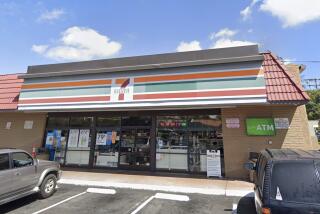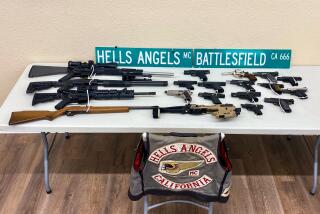The Ku Klux Klan’s ugly, violent history in Anaheim
A Ku Klux Klan rally in Anaheim turned violent Saturday, leaving three people with stab wounds and several arrests.
Here are some questions about the incident and larger movement.
Why did the KKK decide to rally in Anaheim?
It remains unclear. The Klan once was active in the city, but the group’s local activities have been sporadic in recent years.
Last summer, at least 100 residents of Whittier and Fullerton awoke to find packets containing KKK fliers, rife with racist rhetoric, and candy in their driveways. A Santa Ana neighborhood was also blanketed with KKK fliers on Martin Luther King Jr. Day last year, police there said.
An 8-foot cross was burned outside the home of a black man in Anaheim Hills in 2003, and the FBI investigated the case as a hate crime, but police did not specifically link that case to the KKK.
The OC Weekly earlier this month talked to a man who described himself as an organizer of the event. He spoke about his background and involvement with earlier white power groups, including the White Aryan Resistance.
See more of our top stories on Facebook >>
Anaheim police have said “one or two” self-described KKK members have been seen in the city in the last two years. They drove through the Pearson Park neighborhood and distributed literature on Martin Luther King Jr. Day.
Isn’t there a history of KKK activity in Anaheim?
Yes. Klansmen were once the dominant political force in Anaheim, holding four of five City Council seats before a recall effort led to their ouster in 1924.
At the height of the group’s power in Orange County, nearly 300 Klansmen lived in Anaheim, patrolling city streets in robes and masks. A large KKK rally once attracted 20,000 people to the city.
KKK patrols stopped and interrogated citizens, and once burned a large cross in front of St. Boniface Roman Catholic Church.
Indeed, much of the KKK focus in Anaheim and elsehwere at that time was Anti-Catholicism.
How did Anaheim push out the Klan?
Anti-Klan residents had formed a group called USA Club -- for “Unison, Service, Americanism” -- and backed a slate of successful candidates in the statewide primaries of 1924. This would be the first of several major blows dealt to the Klan by the USA Club.
The City Council then went under attack for ordering the removal of a flag and flagpole from the main intersection in town. This furor escalated when a leader of the anti-Klan forces bought a membership list of the local klavern.
The list, which was distributed throughout the town, included the names of the four councilmen, nine of the 10 members of the Police Department and several other city officials.
Soon after, recall petitions against the four councilmen were circulated.
The bitter battle pitted Anaheim’s leading newspaper, the Plain Dealer, which supported the Klan’s candidates, against the Anaheim Bulletin and the Anaheim Gazette.
On the day of the recall election in February 1925, 95% of the city’s registered voters turned out at the polls, which were guarded by city police, sheriff’s deputies and district attorney inspectors.
The Klan suffered a resounding defeat with each councilman losing by more than 500 votes. At the same time, the Klan’s attempt to recall the lone anti-Klan councilman failed.
What are Anaheim’s demographics now?
Anaheim, home to Disneyland and Orange County’s largest city, is now more than 52% Latino and about 28% white, according to the 2010 U.S. Census.
How big is today’s KKK?
KKK activity nationwide has decreased dramatically in recent decades, according to the Southern Poverty Law Center, which estimated the group has between 5,000 and 8,000 members across the country.
ALSO
Ku Klux Klan propaganda blankets Whittier neighborhood
KKK loses lawsuit on handing pamphlets to drivers in Missouri town
Test prep book publisher apologizes for comparing Clarence Thomas to KKK
More to Read
Sign up for Essential California
The most important California stories and recommendations in your inbox every morning.
You may occasionally receive promotional content from the Los Angeles Times.












